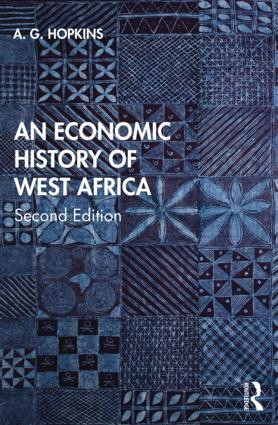Professor Antony Hopkins, your revised, 2nd edition of An Economic History of West Africa (Routledge, 2019) was published this autumn. Why do you think this book has stood the test of time, and remains a reading list staple for students of African economic history, almost half a century since its initial publication?

It would be pleasing to respond by referring to the genius of the author. The truth, unfortunately, is somewhat different. My book appeared in 1973 at a propitious moment, when interest in Africa had suddenly expanded and economic history in general had achieved a rare popularity. So, the luck of good timing favoured its reception. Subsequently, the book has ‘stood the test of time’ partly for the unflattering reason that the subject lost vigour and visibility for about 20 years from the mid-1980s, when no one was willing to invest the considerable effort needed in an area that appeared to have more of a past than a future. If there is a positive explanation for its longevity, it probably lies in the fact that the book had a clear theme and a set of subsidiary arguments running through the text. As my head of department pointed out, in so many words, it was the work of a young man whose limited knowledge (he did not say ‘ignorance’) allowed him to advance confident judgements that an older, wiser scholar would have been reluctant to make.
… it was the work of a young man whose limited knowledge (he did not say ‘ignorance’) allowed him to advance confident judgements that an older, wiser scholar would have been reluctant to make.
In what ways have your own conceptions of EHWA changed since the first edition? What aspects of the book have not stood the test of time? What ideas in it have you since revised?
On this occasion, honesty should take precedence over discretion. I still think that my overarching theme, based on the concept of the market, serves its purpose: it is comprehensive but allows for different applications over the centuries. Moreover, I treated the term as a vantage point to survey a wide range of economic activities in addition to commerce, and applied it, as far as I could judge, in a non-ideological sense and without importing normative freight. I am sure that better approaches can be devised and certainly will be. It is just that I could not, and cannot, think of them, Other possibilities, such as dependency and Marxism, have been tried and found wanting. I experimented with Marxist approaches myself but could not overcome the theoretical and empirical obstacles that presented themselves. However, this is not to say that the book is immune from revision. Far from it. The volume of admirable research available today, some 50 years after I was writing my manuscript, compels revision to numerous individual topics and the amplification of many others, such as the history of the Western Sudan, which I treated indifferently. Indeed, the list of possible improvements is so long that I can do no more here than refer readers to the fuller account in the ‘Introduction’ to the 2nd edition of my book.
The volume of admirable research available today, some 50 years after I was writing my manuscript, compels revision to numerous individual topics and the amplification of many others,…
Already in the 1970s, you were a proponent of bringing factor endowments into the study of African economic history, which has featured prominently in the recent renaissance of the field. Can you reflect on the value of this approach and insights offered by scholars over the past decade?
My very preliminary work used factor endowments (and factor proportions) to illuminate three large problems. The historic land-labour ratio, the ‘transition’ of the nineteenth century, and the vent-for surplus thesis. All three subjects have attracted considerable research since 1973.The notion of a land-surplus economy seems to have stood up to further scrutiny, even though (thanks to Mats Widgren) we now have a much better idea of the extent of intensive cultivation in the pre-colonial period. The proposition that the nineteenth century saw a shift from large to small producers in the new export trades has generated a substantial discussion that has now resolved itself into estimates of the varying proportions of the two types of unit. The vent-for-surplus thesis, which I both used and queried, has been shown (principally by Gareth Austin) to apply in limited circumstances but not to have been the main explanation of export growth in the early colonial period. The most important of the subjects I did not discuss (because my book ended in 1960) is the rapid expansion of population during the second half of the twentieth century. This development has altered the historic land-labour ratio and has huge implications for all the economies of the region.
The African economic history discipline has been booming over the past decade. By now the annual conference attracts over 70 interdisciplinary paper presentations. In your view, what explains the timing of this intellectual impulse and interest into Africa’s past economies? And how have methods evolved over the past 50 years?
The revival of African economic history came as something of a surprise, at least to me, and I have yet to see a fully integrated account of its causes, though influential contributions have been identified. Before about 2000, few economists thought that history was ‘relevant’, and historians themselves, under the influence of postmodernism, had turned away from material considerations in favour of representations of a world in which ‘reality’ was a dubious concept. Change came from different directions. Members of a new generation of economists began to apply econometric techniques to understand the historical roots of Africa’s poverty. Other economists and social scientists, attracted by the plight of what Paul Collier referred to as Africa’s Bottom Billion, accepted that a broader approach, which included history, was needed. Historians themselves abandoned postmodernism and revived material and structural approaches. The Global Economic History Network, which Patrick O’Brien and Gareth Austin did so much to initiate and support, is a prime example of how the new mood was turned into action. With regard to new methods, the most distinctive has been the move towards quantification and its evolution from grand generalisations covering the centuries to more precise hypotheses linked to detailed historical sources.
With regard to new methods, the most distinctive has been the move towards quantification and its evolution from grand generalisations covering the centuries to more precise hypotheses linked to detailed historical sources.
Do you have any advice for budding economic historians of Africa today? What areas of African economic history remain understudied, or in need of revision?
African economic history is booming. The subject has greater institutional support and international recognition it has ever had. The list of possible research topics is long and expanding. These advantages, however, come with a warning, namely that the risk of conformity grows correspondingly. It is easy for newcomers to fit into a particular approach or school but harder for them to think beyond it. There are attractive opportunities in both the ‘new’ quantitative history and the ‘old’ traditional history. The difficulty lies in selecting a subject that will not merely be a footnote to work pioneered by others but will make a distinctive contribution to the field. How might this be done? I would begin, not with a shopping list of topics, but with a problem. My problem was the origins of capitalism; my enquiry took me to tropical Africa because it had not been examined from this perspective. Today, I would start by studying the historiography of the subject to see how the priorities of the present relate to those of the past and why they have changed. A survey of this kind will identify the issues that remain central and enduring, show how they have been treated, and point the way towards filling gaps or correcting misunderstandings. A dissertation formulated in this way should have considerable potential.
There are attractive opportunities in both the ‘new’ quantitative history and the ‘old’ traditional history. The difficulty lies in selecting a subject that will not merely be a footnote to work pioneered by others but will make a distinctive contribution to the field.
Despite African economic history’s renaissance relatively few of the publications have come from authors based at universities between the Zambezi and the Sahara. In your view, what explains this discrepancy and what can be done about it?
The discrepancy can be explained more easily than the remedy can be found. The foreign funding that helped to support research in and on Africa during the 1970s and 1980s was greatly reduced with the end of the Cold War. Political instability and inadequate funding in many newly independent states ensured that the gap was not filled. Many African scholars emigrated to better paid and more secure jobs elsewhere, notably in the United States. In principle, the remedy lies in altering these two conditions. External funding is now likely to come from China, which is already beginning to adopt the financial role that the United States occupied during the Cold War. Internal support depends on economic performance and subsequent decisions about the allocation of tax revenues. There are some hopeful signs amid continuing difficulties. There has been a broad expansion of higher education across a wide range of countries. Particular centres of excellence have sprung up: Johan Fourie’s group in Stellenbosch is one example; Ian Phimister’s graduate school in Bloemfontein is another. These are not quite north of the Zambezi, but they are close! As far as this subject is concerned, the evidence suggests that Africa is far from being the ‘hopeless’ continent.
There seems to be less exchange today than in the past between historians of Africa on the one hand, and African economic historians and economists on the other. Why do you think this is the case? And what could be done to increase the academic exchange between historians and economic historians of Africa?
Economics and history had close links down to the 1960s, when scholars such as Arthur Lewis and Walt Rostow were highly regarded in both fields. The subsequent shift of economics towards mathematics and greater abstraction brought about an institutional break whereby the two groups came to occupy different departments. Recent trends, typified by the new institutional economics, have begun to re-establish links between the two disciplines. There is also a growing recognition among economists that economic formulae are insufficient to solve development problems. How far reunification will go is a matter of guesswork, though it seems that cooperation is most advanced in developing countries rather than in those that are already developed, as witnessed by the Nobel Prize awarded to Banerjee, Duflo and Kremer in 2019. Communication between economic historians and other historians of Africa is less of a problem because they have much in common. Difficulties arise where the subject demands a level of theoretical expertise that is not common currency. Promising exchanges have already occurred as members of both groups realise that leaning across a disciplinary border is a smart way of achieving originality. The move requires economists to understand how historians use their sources and to respect the diversity they invariably manifest and obliges historians to accept that they cannot talk about currency flows and exchange rates without mastering the relevant theoretical literature. Today, discussion across disciplines is greatly helped by the internet, e-mail and Skype. But the most promising way forward is to offer undergraduates the opportunity to learn basic economics and historical methods.
Promising exchanges have already occurred as members of both groups realise that leaning across a disciplinary border is a smart way of achieving originality.
Feature image: Urban street in Ghana in 2010 from Pixabay
https://pixabay.com/photos/street-africa-ghana-city-streets-3644374/

I found this really useful! Thanks for posting!